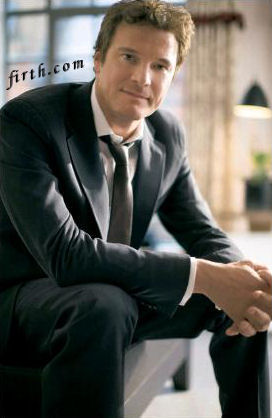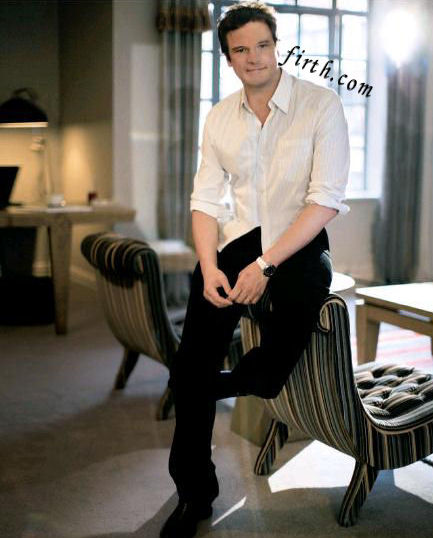People immediately assume that in person, Colin Firth is like his best-known parts—Mr Darcy, of Pride and Prejudice, and Mark Darcy of Bridget Jones’s Diary. That means emotional restraint, British reserve, intelligence, a very male sort of inability to express feelings—as well as devastating physical attractiveness, obviously. And, in essence, they would be right. Emoting doesn’t come readily to the real Colin Firth. ‘I find it difficult, yes, to express grief,’ he says in his deep voice. ‘I don’t cry easily, even though I’ve done it on a film set, but in life I don’t find it easy at all.’ As Harry, a British banker who turns out to be gay, in the Hollywood-backed version of Mamma Mia, Colin manages to overcome his emotional suppression. While his other new role is about the inability to express emotion, either love or grief. And When Did You Last See Your Father?, produced by the people behind Girl With a Pearl Earring, is the story of the writer Blake Morrison, and his relationship with his domineering, charismatic father. The action switches from the adult Blake—Colin Firth—back at his family home as his father lies dying, to flashbacks of his early life as a child, growing up in his father’s shadow. But Colin doesn’t agree with the idea that emotional reserve has anything to do with being English. ‘I married into an Italian family and I find them no less restrained—in some ways more so. When people talk about restrained emotion I think that’s not just the famous British reserve. Other cultures think of it as central to their dignity.’ In the flesh he is polite, but then some subjects will make him suddenly animated and his whole demeanour changes. When you meet him, you’re not conscious of his height (he’s 6ft 1in) but his face does seem a little narrower than in his films—actors’ faces have a knack of filling out on screen. When he relaxes, he has a lovely, engaging smile, but it’s not what you first see. Colin did not have a particularly enjoyable childhood. He spent his first years in Africa where his parents were teaching, his father is a history lecturer and his mother lectures in comparative religion. The family moved back to England, to Brentwood, when Colin was four, and then to Missouri for a year with work when he was 12. He had a miserable time in America, feeling out of place as an English boy; and then, back in Winchester, England, he failed his 11-plus and didn’t relish secondary school.  And
When Did You Last See Your Father? centres around father-son
relationships. Blake’s father, Arthur, played by Jim Broadbent, is a
doctor who thinks his boy is a sissy for studying English. He has high
expectations of him and an utter inability to praise his achievements.
Did Firth recognise anything of himself and his own father there? ‘Not
in any obvious way,’ he says, ‘because my father is so different from
Arthur Morrison. He never embarrassed me publicly or showed off. There
was none of that with my parents. And
When Did You Last See Your Father? centres around father-son
relationships. Blake’s father, Arthur, played by Jim Broadbent, is a
doctor who thinks his boy is a sissy for studying English. He has high
expectations of him and an utter inability to praise his achievements.
Did Firth recognise anything of himself and his own father there? ‘Not
in any obvious way,’ he says, ‘because my father is so different from
Arthur Morrison. He never embarrassed me publicly or showed off. There
was none of that with my parents.‘But they’re both very high-powered people. and so the pressure was definitely there because I felt there was something I had to live up to. They were rather good at saying well done. I just didn’t give them many occasions to say it. I don’t think my father had ever met an actor until I became one. H was totally nonplussed but he didn’t browbeat me by saying, “You should have done something like that.”’ Rather, he says, his parents ‘were incredibly affirming, almost too much so, making me feel that I was brilliant and special. I believed them then, and I still do.’ Firth acted in school plays from the age of five, and at 14 made the decision to be an actor. After sixth-form college—where he wore flares, grew his hair long and listened to prog rock despite the fact that punk was the new thing—he drifted aimlessly, part of the time around the National Theatre, before finally getting into the Central School of Speech and Drama. Does he have any regrets at not going to university? For his contemporaries, somewhere like Cambridge meant a high road to an acting career. ‘A bit.’ he concedes. ‘Well, certain teachers would laugh at the idea that I had it in me to get into Cambridge—or just get a proper university education.’ But when he got into the Drama Centre, everything fell into place. He loved the discipline and structure, the nine o’clock starts. As for his parents, he saw ‘their palpable sense of relief that I was doing something and I wasn’t slacking and shirking and drifting’. He played the title role in the end-of-year Hamlet, and was spotted by screenwriter Julian Mitchell, who cast him as Guy Bennett in the West End production of Another Country, about the school days of a fictionalised Guy Burgess—a role taken by Rupert Everett in the film version, while Firth played the communist firebrand Tommy Judd. He went on to appear in a TV drama about the Falklands War, Tumbledown, and in the Milos Forman film Valmont, the film of Les Liaisons Dangereuses, in which he co-starred with Meg Tilly. They had a son, Will, who is now 17, and never married, but for a few years they lived in seclusion in the outback in British Columbia, where Meg, who is now a writer, and Will still live. Colin has two younger sons, Matteo, three, and Luca, six, with his wife Livia Giuggiolli, an Italian documentary maker whom he met while making Nostromo and who he married on a hilltop in Tuscany in 1997. About Will, he says, ‘We’ve got a very close relationship. There’s a great difficulty with distance but we’ve managed to cope. With my younger sons, the relationship with Will has worked out vey well. It’s a huge age gap—they probably see him as if he’s an uncle.’  The
theme of the new film plainly has a resonance just now, given current
political concerns that absent fathers produce violent and disaffected
boys. ‘I do think we’ve got a problem,’ says Firth. ‘Without wanting to
sound like David Cameron’s think-tank, with all our fantastic social
advancements, we’ve probably left behind some rather crucial wisdom
about family structure.’ So, without actually saying that family values
matter and marriage should be rewarded, he does seem sympathetic to the
idea. The
theme of the new film plainly has a resonance just now, given current
political concerns that absent fathers produce violent and disaffected
boys. ‘I do think we’ve got a problem,’ says Firth. ‘Without wanting to
sound like David Cameron’s think-tank, with all our fantastic social
advancements, we’ve probably left behind some rather crucial wisdom
about family structure.’ So, without actually saying that family values
matter and marriage should be rewarded, he does seem sympathetic to the
idea.In fact, he feels that contemporary life, in which children and parents spend most of their time apart, is fundamentally unnatural. ‘I have looked at my little ones crying when I leave. It’s instinct when you’re two or three: don’t go. We laugh it off, and usually the wife calls, saying “don’t worry, he’s fine now.”’ He likes the Italian approach, where boys stay at home into adulthood. He also likes grandparents being involved. ‘My grandparents were magical figures in my life.’ In fact, three of his grandparents were members of the clergy, Congregationalist and Anglican. ‘Including the grandma,’ he says proudly. They worked as missionaries in India. His grandfather was ‘very, very Nonconformist—as far as religion is concerned, the Nonconformism definitely rubbed off on me.’ Politically, Firth is not so much Nonconformist as self-consciously left-wing. ‘I’m incredibly hostile to the right,’ he says. ‘I’m extremely optimistic about Brown. I haven’t voted Labour since Blair was in power. I might do so now.’ He is also keen on environmental issues. ‘My carbon footprint is probably absolutely despicable,’ he says. ‘I’m just another guilt-ridden, slightly uneasy person tagging along. However, I’ve invested in an eco-retail shop that is opening in Chiswick.’ It is being launched by his wife and brother-in-law, and will open later this year. He refuses to be drawn about which of the actresses he’s worked with who he finds most attractive. Do they make his wife insecure? He laughs. ‘No, I don’t know what it takes, really.’ He has worked with Jessica Lange, Uma Thurman, Gwyneth Paltrow, you name them. ‘I’m spoiled by the whole lot, really,’ he says cheerfully. ‘I’m working with Meryl Streep now.’ Do his friends envy him? ‘God, yes, bitterly!’ The film with Streep is Mamma Mia! which he is shooting at Pinewood Studios, with Pierce Brosnan. It’s going to be gloriously camp, as different from a film about burying your father as it’s possible to get. Will it change the universal female perception of Colin Firth as a brooding, buttoned-up sex god? Don’t bet on it. And When Did You Last See Your Father? is released on 5 October |
